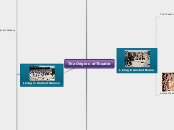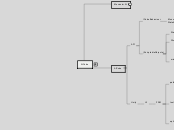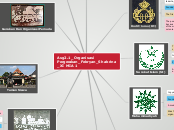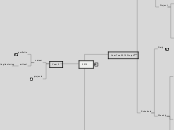The Origins of Theatre
Living in Ancient Greece
The Theater's Main Elements
Parados: an ode sung at the orchestra in the beginning of the play
Paradoi: two walkways between the skene and the koilon
Proskenion: acting areas, forward edge of the logeion
Themili: a small Dionyslan altar of the threshing floor
Koryphaios: director of the orchestra
Logeion: raised platform, main stage that allows actors to stand over proceedings
Skene: backdrop
Koilon: a auditorium built in a semi-circle of rising stone seating
Orchestra: circular, oval or rectangular chorus space located in front of the logeion
Inside the Theater
Periaktoi: triangular pillars that are turned to present a new item of scenery or remove an old one
Ekeclema: wheeled platform for presenting or removing "dead" characters
Aeroema: a crane that allows actors to fly onto the skene
Theologeion: flat roof covering the stage
Polis: a city state in Ancient Greece
Proedria: the first and lowest row of seats reserved for senior figures
Cavea: blocks of seats inside an auditorium
Masks
Actors can easily switch roles by changing there masks
the expression show cahracters' gender, age, feeling, etc.
Painted masks of stiffened fabric
The Actors
Padded clothes, large shoes and wigs are common
Tragic figures wear dark costume, while comic figures wear bright colors
Have emphasis on speech, not action.
All men
The Theater Festival of Athens
There were three types of plays:
Satyr
When performing, people dress as satyrs (half-man, half-beast)
A play that makes fun of the tragic theme of another play, both written by the same author
Comedies
Five authors enter one play each every year
Humorous with rude jokes
Feature ordinary folk, with commentaries on the politics and personalities of the day
Tragedies
Each year three tragedy play writers enter their plays into the contest
Usually about heroes of the Mycenean past
Themes are about human passions and conflicts, the misuse of power, and whether or not to bow to the will of God.
The three most popular play writers:
Sophocles
Plays contain amazing conclusion that thrill audiences
He is the master of dramatic tension.
Plays fores the imagination of theatre-goers
Aristophanes
Very humerous
Plays contain attacks of Athenian officials, music, and a lot of action.
Euripides
Play finales involve actors subjecting to the judgement of God.
Focuses on common emotion and weaknesses of mankind, making it relatable to the audience.
Interesting Facts
From the name of Thespis, who wrote the first play with dialog, we derive the word "thespian", meaning actor.
Drama is a Greek word meaning action.
A Day at the Theater
Aeschylus: father of modern theater
Dionysus Festival: Athens' most religious celebration that lasts five days, the first day devoted to processions and sacrifices, and the last 4 days are taken up with drama and competition.
Ritual
Ritualization is the creation and enactment of new rites
Ritual is based on reality while theater is the imitation of reality
Equivalent for Theater
A torah, scripture, Qur'an or Bible is a script
Believer, followers or congregation is an audience
A priest or an elder is an actor
An alter or platform is a stage
A church, synagogue or temple is a theater
Elements of Rituals:
4. Collective Identification
3. Sense of order
2. Symbolic Role
1. Repetition and Stylization of verbal and non-verbal actions (chanting or gestures)
A ritual is the observance or enactment or dramatization of a set form of rites (ceremonies).
Living in Ancient Rome
Actors, Masks, and Plays
Pulpitum: a stage where the actors perform
Scaenae Forms: a backdrop that is threes stories tall and has a hundred columns
Pantomimus: one who imitates all things and mime the story's actions using masks, musicians and dancers
The most popular plays are mime, pantomime and bandy farces. They are violent, but sophisticated.
The masks enhance expression and amplify voices
Actors wear masks and women are allowed to perform too
The Theater and Domestic Games
Before the Greeks' influence, theaters were flimsy and only created for a particular God
The first theater was built by Pompey the Great and it can seat 27 00 people
Theaters are similar to Greek's except they are made of concrete and stone, and are more elaborate and larger in size
Aristotle's 3 Unities
Unity of Place: action takes place in a single location
Unity of Time: action takes place within a single day
Unity of Action: one single plot with no loose threads









